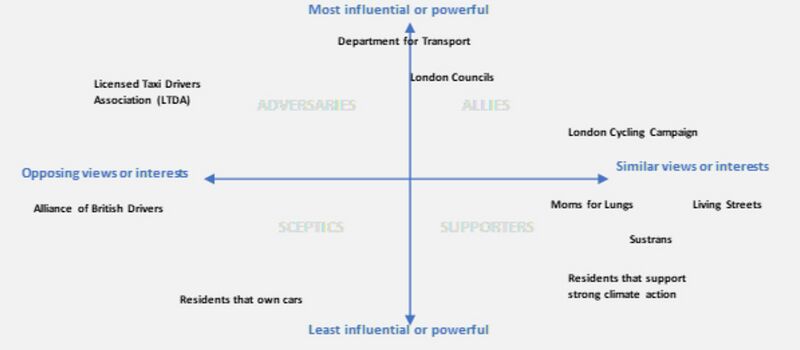Context of London Living Lab (LL4)
Individual Mobility Budget
Instrument Type
Information as well as economic instruments such as individual mobility budgets in the context of fair road pricing/tradeable emission allowances.
Scale
Greater London with a particular focus on inner London.
Scope
All trip purposes (personal mobility) and all transport modes except airborne and waterborne.
Governance Framework
Laws, rules and institutions
Problem Owners
Transport for London (TfL) and Greater London Authority (GLA).
Legal or Executive Power of Problem Owner(s)
National level: Climate Change act 2008 and 2019 Amendment committing the UK to net zero carbon emissions by 2050 which London also needs to adhere to.
Existing Rules
National carbon budgets: The Climate Change Act requires five-yearly carbon budgets which run until 2032 and set fixed caps on total GHG emissions allowed.
Existing Policies
City level: Climate emergency declared in 2018 and Carbon neutrality target by 2030, with associated Climate Action Plan. 27% reduction in vehicle km traveled by 2030; 80% of all trips to be made on foot, by cycle, or using public transport by 2041 (not legally binding).
London Ultra Low Emissions Zone (ULEZ)
London Congestion Charge (CC)
Enforcement
The Greater London Authority and TfL are not able to control enforcement of the Climate Change Act. They can, however, enforce city-level policies such as the ULEZ and CC.
Availability and Access to Resources
Net Budgetary Impact for the Problem Owner
Potential reduction in fees from congestion charging coupled with lower public transport fare revenue + implementation costs could lead to a net negative impact for TfL budget in the short-term, exacerbated by ongoing funding crisis.
Data Availability
Very high level of data availability through TfL, although access to data is still being clarified.
Administrative and Technical Capacity
High degree of technical capacity, especially within TfL, although constrained budgetary context may limit administrative capacity and ability to follow through on implementation.
Adaptability of Local Economy
High degree of ‘remotable’ knowledge economy jobs, limited need for private cars in inner London due to high density and extensive public transport and cycling network.
Walkability and Cyclability
High degree of walkability and cyclability in central inner boroughs, and recent improvements in cycling infrastructure even in outer boroughs facilitating active travel. 80% of residents across London now live within 1 km walk of both education and healthcare.
Politics, Ideologies, and Attitudes
Problem Owner Ideology on Climate Action
GLA and TfL aligned on urgent need for decisive climate action. 1.5-degree compatible Climate Action Plan sets out ambitious carbon reduction targets, including for transport emissions, recognition that transport represents the most challenging sector for decarbonization. Climate emergency formally declared by both London and the UK government as well as 28 of London’s 32 boroughs.
Political Stability
Generally stable political environment within London, next mayoral and city council elections to take place in May 2024.
Level of Opposition to Climate Action and Policies
Limited opposition within London city government, although at sub-city level some boroughs are more enthusiastic than others (e.g., declaration of climate emergency, embracing transformative mobility projects vs. opposition to cycling infrastructure and continued support for car use). More challenging national political context with some question about real commitment to more comprehensive climate action and policies.
Political Engagement
Moderate, voter turnout of 42% in last local elections (2021).
Public Perception of Climate Movement
Strong support for decisive climate action and sustainable mobility policies and the wider climate movement among certain population groups, but also considerable skepticism in other segments (vocal minority), particularly in relation to any policies that restrict car use (see, for example, controversy around Low Traffic Neighborhoods and the Ultra Low Emission Zone/expansion of congestion charging).
Cultural Attitude towards Car Ownership
Strong anti-car views in some segments of the population, mostly living in central areas. In outer boroughs, car ownership is significantly higher and the picture is more mixed, with car ownership and car use culturally more engrained.
Stakeholders, Interests and their Influence
Shocks
Brief Deion of Recent Events that may Impact the Implementation of Individual Mobility Budgets
War in Ukraine and exacerbation of existing energy and fuel crisis; significant cost of living increases and inflation putting pressure on household budgets.
COVID and ongoing hesitancy to return to public transport (?)
